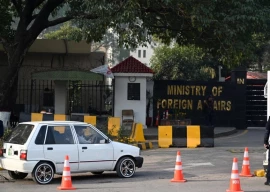Two very serious questions are to be determined. First, does the conviction disqualify the prime minister? Second, if so, is sanction automatic or does it require a further constitutional step by the speaker or chair of the National Assembly?
In order to be eligible for the office of the prime minister, the candidate first must be a member of the National Assembly. Accordingly, whilst the prime minister can only be removed through a vote of no confidence, a member of the National Assembly may be subjected to the rigorous requirements of Article 63 which outlines twelve grounds on which a member of Parliament can be disqualified, one of which is that if he has been convicted by a court of competent jurisdiction of (an act) which defames or brings into ridicule the judiciary.
In order for the prime minister to be eligible for that office, he first needs to be a member of the National Assembly. If his membership of the National Assembly is subject to disqualification then he is ineligible to be prime minister. The question, therefore, is not whether the order of the learned judges disqualifies the prime minister but whether it disqualifies him from being a member of the National Assembly. There is no doubt that on an initial reading of the short order — particularly the summary of the learned judges that the judiciary has brought in to ridicule — that provisions of Article 63(1)(g) automatically kicked in.
Once the ground for disqualification is established, the question to consider is whether the sanction is automatic or whether it requires an additional constitutional step. The answer to that is somewhat debatable. Article 63(2) states that if any question arises whether a member of parliament has become disqualified from being a member, the speaker or the chairman shall, unless they decide that no such question has arisen, refer the question to the Election Commission within 30 days.
The phrase “any question” is curious for it is capable of having multiple meanings, all of which are capable of further examination. It is capable of denoting that Article 63(3) should only be invoked in the event of there being any doubt about disqualification as well as denoting that it can also be invoked if there is any issue (whether it is beyond doubt or not). If the earlier interpretation is applied, then Article 63(1)(g) leaves no room for doubt and the prime minister is automatically disqualified. However, if the latter interpretation is applied, then disqualification is not automatic and the matter has to be referred to the Election Commission for the final opinion. However, before such a referral is made, the speaker or chairman has the right to consider that no such question — disqualification or no disqualification — has arisen. It is unclear what factors form the basis of this consideration but clearly, judgments — in this instance a Supreme Court decision — can be reviewed and, if necessary, ignored.
In short, and notwithstanding the clarity of Article 63(1)(g), the speaker or chairman may exercise such an option and not refer the matter to the Election Commission on the basis that no such question has arisen. Whilst this is unlikely, it is not beyond the realms of legal possibility. Accordingly, whilst such an important issue as this should be determined by a court, it is entirely within the ambit of the Speaker or Chairman of the Assembly to take a different view. What the current crisis has made clear is that it is now time for Pakistan to look to establish a separate Constitutional Court which looks solely at how the constitution is to be interpreted.
Published in The Express Tribune, May 4th, 2012.
COMMENTS (9)
Comments are moderated and generally will be posted if they are on-topic and not abusive.
For more information, please see our Comments FAQ


















Brilliantly articulated Mr Rana, it would appear that you have a much better understanding of Pakistan's Constitutional System than the politictians working within it.
by having a court on constitutional matters you are making the court structure more complicated. there is, in my opinion, no such big deal, all the complications are created by person who are propagating a particular agenda, or by persons in order to attract attention.
such an irony that lay and media persons have turned into legal experts, trying to interpret the provisions of law and Constitution, having not the basic knowledge,
All we need is to wait for detailed judgment, this is how gaps and lacuna in laws are filled in by courts following system of common law.
your interpretation of "any question" is in my humble opinion is incorrect, for the reason that if an issue is raised by a member parliament accusing another for the violation of article 63(1) (g), only than conditions of article 63 (2) be applied,but if supreme court categorically states that such violation is made, the provision of article 63(2) is not at all attracted.
furthermore, the reason for giving discretion to the speaker NA for exercising discretion in respect on issue pointed by member parliament is primarily because, the member parliament may not be expert in determining the action,( or upon the accepted principle, " no one should be judge in his own cause") so the speaker than has a limited discretion,
if the court in its judgement raises such a question, the discretion does not at all lies with the speaker of NA or chairman senate, and the matter would be ipso fact sent to Chief election commissioner after the lapse of 30 days, for determination on the question of disqualification raised by the court.
no, this is unprecedented and unnecessary. those who criticize SC and consider this as judicial activism should realize that after the army became uninterested and where there is no respite from the govt people see SC the only savior. before it was army, so its natural. people who think present SC is dealing only with the political cases should go to its website they'll see how little is the percentage of cases of political nature. now, about the decision, acc to the author, suppose CEC or the speaker finds out that no crime has been committed and hence ignore the decision then what? does the author think matter will rest here and everything will be forgotten and forgiven? won't the matter go back to SC for a final decision? will CEC or speaker's ignoring it will be final???? finally again, will rest with the SC, this is what i think, may be i'm wrong but prove me otherwise!
It is a recipe for disaster especially in a common law country like Pakistan. It is nothing but an invitation to jurisdictional tussels.Cases which go this high up are rarely single issue and touch on many different areas of law. How do you define a case as "rasing a constitutional point". Was Mehram Ali (http://en.wikipedia.org/wiki/MehramAliversusFederationof_Pakistan) a constitutional case? Yes it was. Was it a criminal case? Certainly. Was it an Administrative Law case? Yes it was. So how do you define which case gets heard by which court? If you say that any case which raises a constitutional issue can go to the Constitutional Court, well then all you have done is creat another level of Court above the now not Supreme Court; for the simple reason that of the handful of cases which reach the Supreme Court each year, all of those must raise a point of law on a matter of public importance; in other words, a constitutional law issue.
Its a poorly written and poorly thought out article.
Excellent piece - I think it's your first here?
Hell to the no. Too much funding being eaten away on everything..... more provinces is a failure..... as we can't afford it. More courts too just because of one decision where only the short order has been presented...... more diligent work required Mr Author. Let the long order arrive, it should clear all ambiguities
"If his membership of the National Assembly is subject to disqualification then he is ineligible to be prime minister." No. That is not correct. Those rules are stretched to their literal wording. If it says he needs to be a member before becoming prime minister, it can be bent to translate to: after becoming prime minister he could leave and still hold the position because it's only a requirement to meeting the eligibility of entering the electoral process itself, not that of holding onto the office. That process is over. Though it could be used to not allow him to run again.
I'm splitting hairs but so will everyone else under the sun when it comes to this. It's things like that, that trigger future clarification in those rules/laws. What you've actually stumbled upon is something that would be considered a loophole in the PM's favor. Not something condemning him.
current supreme court is dealing almost entirely with political matters. it is partisan as seen by millions of not all CJ os showing political affiliations and inclinations a constitutional court is the solution and idea was floated by PPP a few years ago but it sure is unacceptable to mr chaudhaty if a chief justice was so contraversial in a western society, he would have resigned
A great legal analysis by an out of the box approach. Pakistani SC is supposed to be a constitutional court but unfortunately it has degraded itself to a lower trial court. Most cases against the elected govt officials are taken up by the SC directly without leaving a right to appeal to another higher court. However, the less politically important cases like Taseeer and BB murders are left to rot in lowest courts.